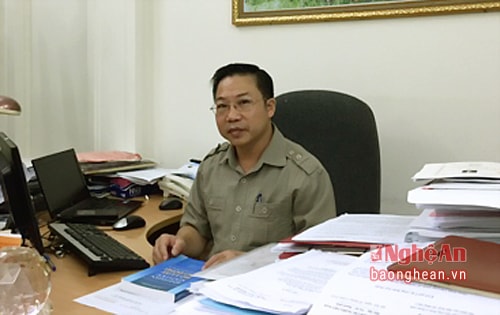How to handle the responsibility of officials and collectives for mistakes in law making?
Mr. Luu Binh Nhuong, Director - Head of Department III, concurrently Deputy Chief of Office of the Central Steering Committee for Judicial Reform, National Assembly delegate of the 14th term of Ben Tre province, discussed solutions to improve the quality of legal document drafting in the coming time.
PV:How do you view the suspension of the 2015 Penal Code due to many errors? In your opinion, what are the lessons learned from some of the errors in the law-making process?
Mr. Liu Ping Ruong:Through the incident of delaying the implementation of the Penal Code, state agencies, organizations, businesses and people have paid special attention to the work of law-making. In fact, not all the legal documents issued before were perfect. But the "incident" of the Penal Code is very big, and it is a very important law passed by the National Assembly, therefore, it has strongly attracted the attention of the whole society.
Although the National Assembly has promptly accepted responsibility as the “decision-making body”, a number of relevant agencies have also begun to review their responsibilities and continue to advise on how to overcome this problem. However, I believe that we need to learn from this experience.
 |
| Mr. Luu Binh Nhuong, Director - Head of Department III, concurrently Deputy Chief of Office of the Central Steering Committee for Judicial Reform. |
The first,Lessons must be drawn from the cadre stage, because cadre work is the leading factor determining the quality of a legal document. Training, fostering, assigning, leading, directing, and managing the team of cadres doing law-making work, especially legislation, must be given more attention. Accordingly, the drafting agency needs to have measures to improve the quality of the team directly drafting legal documents (VBQPPL). Although each ministry, department, and branch has a Legal Affairs Department. However, up to now, the legal work here has mainly been done for advisory work, of an internal nature, not for professional implementation of legal document drafting.
I think that there needs to be a gradual professionalization of the legal staff in ministries and branches, especially the Ministry of Justice. Similarly, the legal department of the Government Office and the National Assembly Committees must select staff with high legal expertise and dedication to law-making activities.
Monday,Regarding the legislative process, it is necessary to consider important laws and codes that must be delayed, and even have plans for agencies to prepare in advance. For example, the Penal Code and the Civil Code are extremely large codes, requiring time, intelligence, human resources, and all resources. If there is no "pre-drafting" stage, it is necessary to prepare carefully, collect public opinions and comments from relevant ministries and branches very carefully. I think that comprehensive opinions should be collected, in addition to key issues, there must be specific instructions for agencies, organizations, and individuals to study and give in-depth opinions on the content, wording, and specific provisions... Avoid the situation of only stating a few important highlights or having different opinions and requesting opinions. In reality, when researching and giving opinions, most people focus on issues that have been guided and oriented without paying much attention to other issues.
Particularly for agencies directly applying the law such as: the Procuracy, the Court, lawyers and jurists must have written explanations on the issues on which opinions are expressed.
PV:In reality, the proportion of full-time delegates to do this job is not commensurate with the demand. Is this perhaps a reason for this?The quality of the law is not guaranteed. As a National Assembly delegate, what is your assessment of this issue?
Mr. Liu Ping Ruong:As we know, each term, the National Assembly must pass many important laws. Although the current rate of full-time representatives has been increased from 25% to 35% according to regulations, it is true that it does not meet the requirements for performing the functions and tasks of the National Assembly according to the Constitution. In fact, there have been many opinions that it is necessary to increase the rate of full-time representatives to at least 50%, and eventually to have 70% of full-time representatives to improve the quality of documents and decide on the most important issues of the country, especially to limit the number of representatives working in executive agencies; because in reality, those representatives are very busy in directing and operating daily work, and the executive work is very massive, just doing a good job of operating is already a great success. That also contributes to implementing the principle of division, coordination and control of state power.
Back to the question of why all the errors of the Penal Code have been put on the table for discussion, but the National Assembly delegates still do not discover them?
Current public opinion holds that, in some aspects, it can be inferred that the quality of the representatives is not high, even reflecting that a group of National Assembly representatives have not fully promoted their responsibilities in researching documents, contributing opinions at the National Assembly forum, or seem to "leave it all to" the drafting agency, the submitting agency, the appraisal agency in the process of law making. In my opinion, this is an opinion that needs to be studied properly and objectively to have measures to improve the quality of consideration and decision of National Assembly representatives in the coming time.
PV:The Law on promulgation of legal documents, effective from July 1, also stipulates the responsibilities of agencies, organizations, and competent persons in the development and promulgation of legal documents. However, many opinions say that the regulations are too general, leading to a situation where if mistakes occur, "no one cries over the common man"?
Mr. Liu Ping Ruong:Responsibility in law-making is very different from responsibility in implementing an issue, especially when it involves many subjects and goes through many different processes and stages.
For example, if only disciplining an individual, a Minister or a Department Head, is not entirely convincing because each draft law has a Drafting Committee, and the Drafting Committee includes many participating agencies, all of which have common responsibilities. The subjects submitting the draft law are currently the Government, the Supreme People's Court, the People's Procuracy... Furthermore, the Law on Promulgation of Legal Documents currently only has Chapter XV regulating "Supervision, inspection, and handling of legal documents" (including Articles 162 to 167), which does not stipulate cases similar to the wrong drafting and passing of laws as in the case of the Penal Code; does not stipulate the handling of responsibilities of subjects in drafting legal documents.
Therefore, I think that setting up a specific sanction to handle the responsibility of cadres and collectives who make mistakes in drafting and promulgating legal documents is extremely difficult, especially it is impossible to "handle responsibility towards the National Assembly" because of the responsibility of passing the law. I am really concerned about this issue. I suggest that it should be researched and specifically regulated so that it can be applied later.
However, the fact that the 13th National Assembly took responsibility and remedied by suspending the validity and amending the inappropriate and unscientific provisions of the 2015 Penal Code has shown itself as a form of self-"sanction" regarding its duty to the people and voters.
For the agencies and individuals responsible for drafting, submitting, and reviewing draft laws, it is not always necessary to create laws with many errors. However, in some aspects, it is necessary to review responsibility. If there are many serious violations in policies and viewpoints, and if a law is submitted with too many problems and "errors", it is also necessary to quantify the errors and responsibilities accordingly. It is necessary to study international experience in this matter to make appropriate regulations.
PV:Thank you very much!
According to dangcongsan



